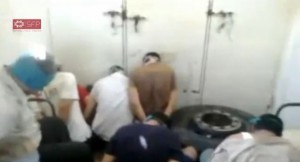Forcibly Disappeared in Homs: A Wound that Won’t Heal

Editor’s Note: The people interviewed for this story asked that their last names not be printed for their own protection.
Rahif Ghanem
22-year-old Nizar and his wife Hiam have been married less than a year, but unlike most newlyweds, their life together has been marked by tragedy from the start. Hiam, 30, was married to Nizar’s brother Abdullah, a taxi driver. They were all residents of the embattled Homs neighbourhood of Baba Amr before the Syrian civil war began.

Baba Amr was the scene of some of the first big protests during the first days of the anti-government uprising in Syria. Later, it was an opposition stronghold that the Syrian government besieged with bombs and tanks. But Abdullah stayed away from the protests, and then the fighting, his brother said.
“Abdullah never went to a demonstration, nor was he a Salafist or a terrorist – Abdullah was a simple man,” Nizar said. “Every day he crossed dozens of army checkpoints; they would stop him, search his car, and then let him go.”
But Nizar says one day last August Abdullah did not come home. The family was informed that Abdullah was arrested by government security forces as he finished a day of taxi driving. In the following days the news updates the family received about Abdullah’s situation only grew worse.
“We were informed three days later that Abdullah was in poor condition and had been taken to the Military Hospital,” Nizar said. “We went to see him, but they did not allow us to enter.”
The family was informed through a lawyer that Abdullah died and was buried in the Tel Al-Nasr cemetery in Homs under the supervision of Syrian government security forces. The family was not told when or how Abdullah died, nor were they allowed to examine the corpse. The site of Abdullah’s grave remains unknown.
Four months later, Nizar married Hiam and adopted his late brother’s five children. Abdullah’s family blames the Syrian government for Abdullah’s death.
The story of Nizar and Hiam is not unique. Most of Homs has been targeted by military operations, although Baba Amr has borne the brunt of them – more than seven government attacks occurred there during February 2012. This year, fighting between the government forces and opposition fighters erupted in Baba Amr again in early March, forcing hundreds of neighbourhood residents to flee.
The Syrian government security forces attacked the areas of Khalidiya, Jouret Al Shayyah and Bab Al Sibaa. During these operations, which included frequent bombardments and mass arrests, simply living in a certain neighbourhood could be grounds for detention.
Often, the families of those who are detained never find out what happened to them – they are neither released, nor does the government admit to holding them. These are cases of enforced disappearance, a crime under international law. According to the Violations Documentation Center in Syria, which depends on the Local Coordination Committees for its information, many of the Syrian citizens missing in Homs have been “disappeared” by the government, in addition to the detention of more than 1000 other Syrians. The actual figures may be much higher.
Nizar’s family is lucky compared to many others: at least they know what became of Abdullah after his disappearance.
A 26-year-old woman named Hanan has been less fortunate. Her husband, Mustafa, has been missing since government security forces detained him during a house-to-house search of their neighbourhood on March 4, 2012.
“After they searched the houses they took Mustafa, and we’ve known nothing of him since,” she said. “We tried to ask about him in all the security branches in Homs but so far there is no news to confirm whether he is dead or alive.”
Sami, 38, from the devastated Homs neighbourhood of Jouret Al Shayyah, has been searching for his brother, Kinan since he disappeared nearly a year ago, in June 2011.
“I was with my mother and my little sister during the bombardment of Jouret Al Shayyah,” Sami said. “Kinan was in the village of Zara in the Talkalakh area when he contacted us to tell us he was coming with one of his friends to get us out of the neighbourhood. He did not make it.”
Sami suspects either the Syrian government security forces or the paramilitary shabiha abducted his brother.
“My brother and his friend disappeared along with the car they were traveling in,” he said. “We still don’t know what became of them.”
Families who have lost a loved one say they feel a profound sense of emptiness. Hiam, the widow of Abdullah and now the wife of his brother Nizar, struggles to bear the loss of both her husband Abdullah and her brother.
“On the same day my husband was detained…I received news of the death of my brother, who was also detained for four months,” Hiam said. “I cried that day, but I do not know if I was crying for my husband or my brother.”
